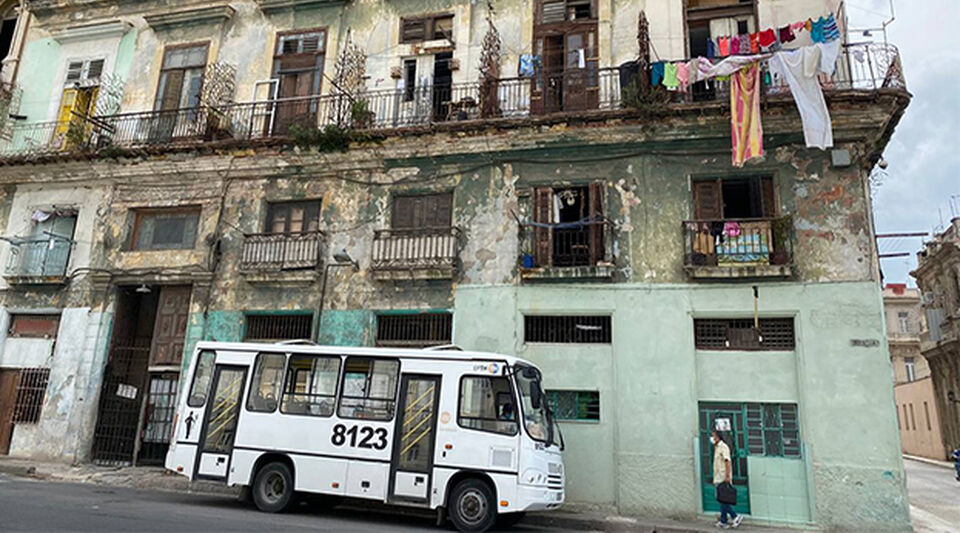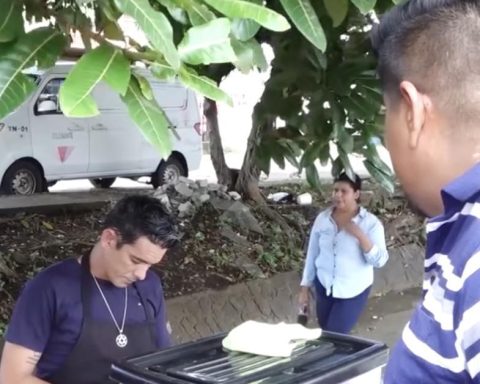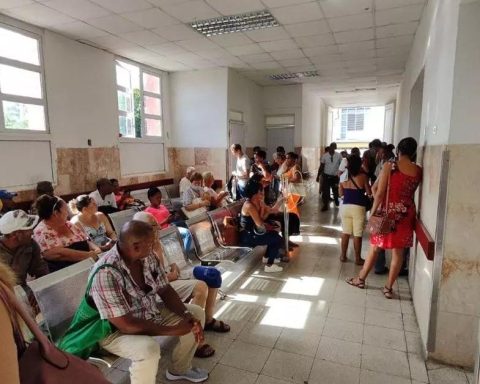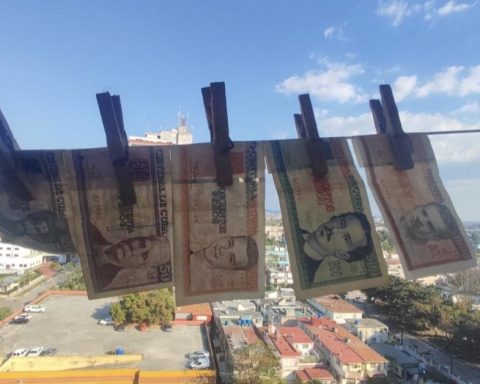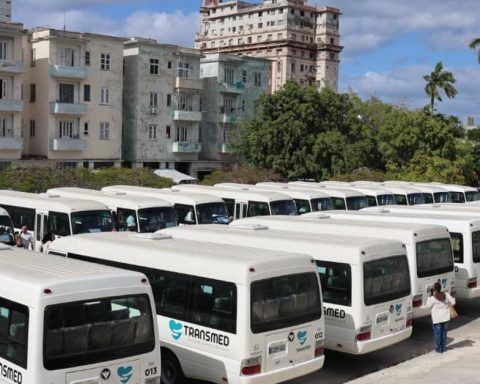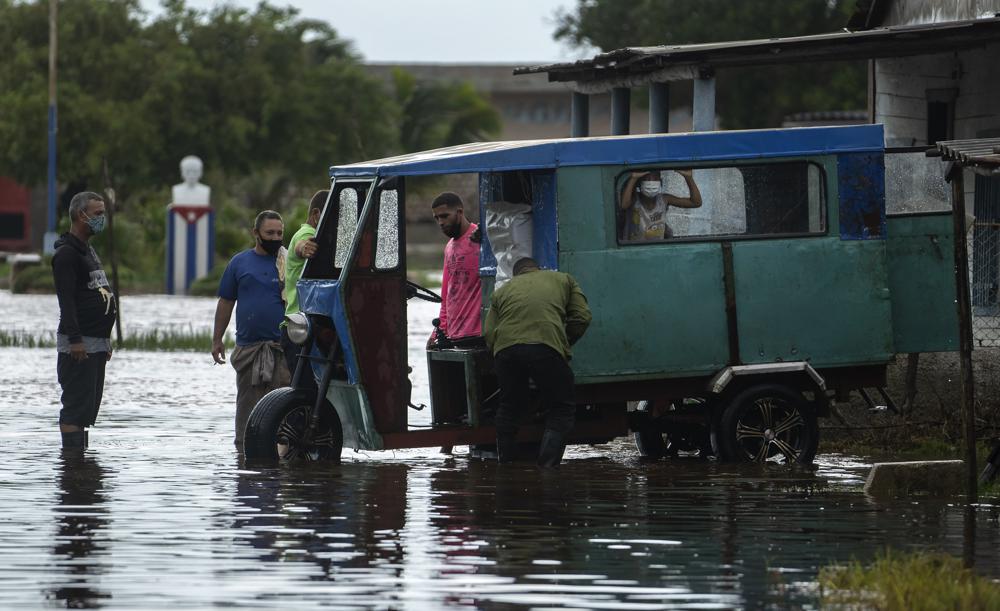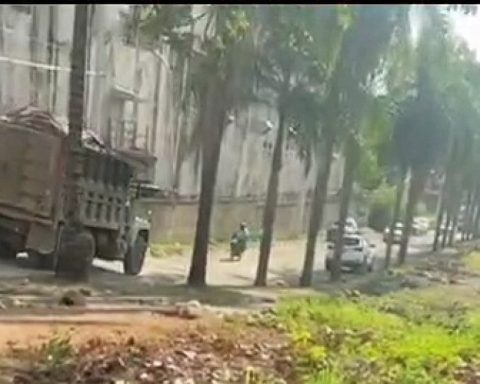Dodging the leaks, the cracks in the floor and the struts that go from the ceiling to the floor, Yamila, with a bag in each hand, goes down the precarious staircase of the building that is on the corner of Industria street with Barcelona. The woman, in her 50s, has been living in the building for 20 years, which before 1959 was known as the Gran América hotel. The building, located right at the bottom of the Capitol, was famous for its views and was then sold as “the house of choice” for families who “like to live well and cheaply.”
“This is in very bad condition and nobody tells us anything, the downpour a few days ago wiped out everything. The three floors next to my door fell on November 17, 2020 at exactly twelve o’clock at night. I told him I wrote to the first secretary of the Party and it was just for fun, there is no response,” laments the woman.
She says that she has been working for years in the City Historian’s Office and her job is to “make houses” for others. “Right now I’m doing an apartment building and I wonder, and when is 502’s turn? This block is completely on fire, everything is falling apart, here the floors are sunken and nobody does anything.”
She explains that in order to deal with the situation, she and other neighbors “give the house a helping hand from the inside to avoid tragedies” and make small repairs, but in the end all the effort is in vain. She also says that already some families “who have somewhere to go” have moved and left their apartments closed.
“I don’t remember the date, before the building was classified as uninhabitable/repairable but not anymore, it’s about to collapse”
“What happens is that many of us don’t have another place and we have to stay here even if it’s dangerous. I don’t remember the date, before the building was classified as uninhabitable/repairable but not anymore, it’s ready to collapse but nothing happens and it’s falling to pieces with us inside,” he warns.
Yamila assures that, as part of her work, she participated in the preparations for the 500th anniversary of Havana and in the reconstruction of the Capitol for that date. “A lot was invested in that and then? What are we talking about? And us? Ah! Well, we continue to live in a disaster zone, without the minimum conditions for a human being, there is no one who lives here as a human being, I’m not going to go to a shelter because that’s also a danger.
The neighbors have put boards or stones on the holes that have been opening in the floor, the largest plank is on the top floor and they have baptized it “the Brooklyn Bridge”.
A young neighbor who preferred not to say his name says that when he went to live in that building it was not in such bad condition. “I moved here when I was seven years old and I’m 34. Here on that wall in the hall there was a big mirror with two porcelain dolls in each corner,” he recalls.
A few years ago there was a fire that damaged several floors and he says that “between the water and the years” it has almost completely collapsed in that part of the building and that few now dare to approach that area. Showing the remains of a burnt-out kitchen, he says: “The fire was there. A mother lived with three children, one of whom died because she was nervous enough to go into the bathroom and by the time the firefighters arrived it was already too late.”
He details that long before the fire they had shored up the entire structure inside “because the floor was sunken” and continued to give way over the years. “Some, those who have been able to, have moved in with relatives. Right now there are about 30 apartments occupied by different families, we are bristling because every so often pieces of the ceiling collapse because the wood is split,” he says as he climbs a spiral staircase It seems to be about to collapse.
As if it were a jewel, he points to a small elevator and assures that it works, but that it is not always used because the neighbors have agreed and it is “reserved only for a little neighbor who is physically disabled.” He proudly assures that it is the “first elevator in Havana” and adds: “It is an Otis brand.”
Alcides Martínez Borges, 48, comes out of one of the corridors, twelve of them living in that building. “Everything moves just by stepping on the ground, everything shakes, all the time water falls on me from the ceiling, stones, pieces of wood that have completely collapsed. That beam over there is broken, when it rots that comes down, too.” one of these days,” he complains. “Housing here does not solve anything, there have been uprisings for a long time, many meetings but in the end it is for pleasure, nobody gives an answer,” Martínez concludes.
He also points out that it is up to the Government to take action on the matter because it is a multi-family building. “If the government doesn’t give materials or give anything, how is it going to be fixed?”
“I’m not afraid to walk around here anymore, no matter what happens. It’s been raining for several days and look, I still have the basin on. And this is in the back of the Capitol, the very Parliament, which is so that they there would have the vision to ask themselves: how are the conditions of 502? , no one has had the courage to come to see how we live and they are 10 steps away from us that we have to see them when they enter and when they leave,” he adds without taking his eyes off the ceiling beams.

A neighbor interrupts him and points out: “Sometimes when Diaz-Canel or any other boss comes, they force us to close the doors and windows of the balconies that overlook the Capitol and to stay inside the building until they pass.”
Going up the spiral staircase, at the end of the corridor on the second floor lives Roersis Ferrera Reyes, 58 years old. She has been living in that apartment for 10 years but she has known him for much longer because her mother lived before her for almost 20 years. He agrees with his neighbors that “the greatest impact” he has to suffer is the leaking of the roofs when it rains: “Especially in the room, when they put the water in the building, many tanks overflow and it also leaks into my apartment.” .
He says that when the neighbors have gone to ask the government authorities for an answer, they give him two arguments, that the characteristics of Old Havana “do not resemble any other municipality in Cuba because, together with Centro Habana, it is one of the most populous and with a lot of floating population too” and that “there are more than 19,000 people in the municipality who are homeless and it has not been possible to resolve the majority of people in this situation”.
The solution they propose is always the same: wait. “That’s what we’re at, we’ve been at it for a long time, waiting for a solution with the fear that one day everything could come crashing down, I live with my niece and her 14-year-old son, she doesn’t stop here because she’s afraid of a landslide, when it rains It’s terrifying, we know that a tragedy can happen at any moment,” says Ferrera.
After more than 20 years going up and down the same stairs, for Marilis Blanco Martínez, 57, the story is already too heavy. She shows every crack in her house with the pain and despair of someone who can lose everything overnight.
“Here the damage is in all the walls above that are cracked. Also in the floor that is sinking. The ceiling filters me, if my neighbor from above scrubs everything here floods, they already ruined a television once “Here I live with my daughter and my two grandchildren. Now I had to send them to the East with my family because this is very dangerous and I don’t want a landslide to kill my grandchildren and my daughter, who is 25 years old.”
“I sleep asking God every night, I ask him that if this is going to fall, let it be when people are in the street”
He repeats the same thing that his neighbors have denounced, that the authorities have never given them a solution, that they come and look and nothing happens. “A month ago, for example, our ground floor was flooded with sewage water and debris from a landslide. We had to tell the delegate that if they didn’t come to pick up and fix the grave, we were going to throw everything in front of the Capitol. Then it was They came, cleaned and fixed it. In those days you couldn’t sleep because of the amount of mosquitoes there were”.
She says that her daughter warned her that she will soon return home with her two children despite the risk “because there in the East they are in great need and there is nothing to eat” and at least here they have the food they sell through the ration book.
“I sleep asking God every night, I ask him that if this is going to fall, let it be when people are on the street. I go to work in the morning and come back in the afternoon. My neighbor next door It was for rent because I couldn’t stand the fear anymore, but I don’t have money for that. Here the people of the building no longer want to go down to the meetings, or pay the CDR or anything, they are upset, many years listening to the same story ” , recounts with the suspicion between his teeth and the complicity of another neighbor, who confirms with his head each word he has pronounced.
Suddenly María Dolores Cuesta Alemán appears, she comes running. She is 44 years old but she looks like she is sixty, it is seen that her life has hit her hard. She wants to talk about her tragedy, to show the ruin in which she lives in the hope of one day solving her problem. Her apartment is small, in the same room there is the bedroom, the kitchen and the bathroom with a balcony that overlooks the Capitol.

“The conditions here are critical, I go to the Government and they tell me that they are going to solve it and in the end nothing, I went to Social Welfare with a letter asking them to help me with a minor and my daughter, who are not here, because I had to send them for Mariel, although we are all here in the civil registry of this building, and they have thrown us like dogs”.
He points to a thin, long-haired man who is sitting quietly on the edge of the bed with his elbows resting on his knees and says with a mixture of firmness and resignation:
“I’ve been with him for 16 years, he had cerebral ischemia and he has to stay here, he himself has complained and they don’t solve his problem either. How long do we have to stay like this? As if we were dogs, we are humans. Here all The conditions are critical, water falls on me everywhere, at any moment this goes down. I have gone to the Government, to the Plaza de la Revolución. I ask myself: what do I have to do? Because I am not going to go as a prisoner, I already went and I’m not going to go anymore, I have a daughter and a grandson who need me on the street”.
________________________
Collaborate with our work:
The team of 14ymedio is committed to doing serious journalism that reflects the reality of deep Cuba. Thank you for joining us on this long road. We invite you to continue supporting us, but this time becoming a member of our newspaper. Together we can continue transforming journalism in Cuba.
